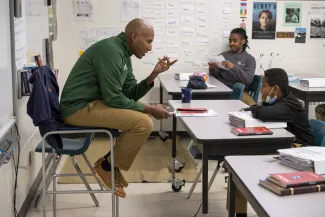Grantee Story
Investing in Education, Equity and Opportunity
with Washington Jesuit Academy
Published Oct 16, 2023
When Anthony Haynie applied for a sixth-grade spot at Washington Jesuit Academy (WJA) in 2007, he intentionally gave a lackluster interview. Haynie said that coming from a DC public school, a boys-only school with a very long day was unappealing. His mother, upset with him, spoke to the school, which gave him a second chance to interview.
Today, Haynie is a graduate of the Syracuse University Newhouse School of Communications and works for WJA’s Office of Student & Alumni Success Graduate Support. “WJA opened so many doors for me and when people asked me to sum WJA up in one word, I always say ‘opportunity,’” Haynie said. With WJA’s support, Haynie applied for, and received, a scholarship from the Jack Kent Cooke Foundation that covered the costs of attending Georgetown Preparatory School and Syracuse.
WJA is a tuition-free, extended-day, extended-year, academically demanding independent Catholic school serving boys in grades 4-8 from low-income and under-resourced communities in Washington, DC and Prince George’s County, Maryland. Established in 2002 by Jesuit and community leaders, WJA addresses systemic inequalities by providing a range of services and resources, from three meals a day to guidance for alumni through high school, college and beyond. “We give them a first-rate education and experience that opens up new doors for them that they otherwise probably wouldn’t have been able to go through and achieve,” President Marcus Washington said.

A teacher engages with students during a lesson at Washington Jesuit Academy. Credit: Lisa Helfert Photography

A teacher engages with students during a lesson at Washington Jesuit Academy. Credit: Lisa Helfert Photography
Seventy-nine percent of WJA’s student body are Black, 18% are Latino, and 3% are Biracial; 78% are non-Catholic. All students and their families demonstrate significant financial need and the average household income of a WJA student is $37,970 for a family of four. WJA currently serves 133 students and 390 alumni
The Clark Foundation has supported WJA since 2004, in line with its commitment to strengthen and support high-performing educational institutions with strong leadership serving the DC region.
WJA believes that by engaging young men during the vulnerable middle school years and preparing them to succeed academically in high school and beyond, they will become role models and leaders in their communities. More than 60% of alumni graduate from college, significantly higher than the rate of 18% of their communities’ counterparts. “Middle school is where a lot of the wheels fall off for so many students,” Washington said. “We fill a void in the community that is needed from a middle school male perspective, and then by the time we’re done with them, they’re fully prepared for high school.” WJA also requires significant engagement and participation from parents and guardians
The school has a transition process for incoming students, understanding that they need time to adjust to new standards, expectations and rigor. But upon graduating, Washington said, “You have a more confident kid who is not intimidated in diverse environments. They have a much better idea of who they are and more importantly, who they want to be than when they first arrived at WJA.”
Nayeem Woods, a current eighth-grader, said he embraces WJA’s structure and high expectations of students. “You can’t go into class without shaking the teacher’s hand and looking them in the eye. When you leave the class, you have to clean up your area and you also have to say thank you to the teacher,” Woods said.
Both Woods and Haynie repeatedly discussed WJA’s mantra of “Be a man for others,” which students exemplify in a range of ways, from collecting Chromebooks after a class to speaking to students who may need extra support. “That’s a time when another man steps up, and being a man for others means taking on that role to get the job done,” Woods said.
Washington said that the Foundation’s 2017 investment in the school’s building to modernize and brighten it has significantly improved students’ mindsets and attitudes. “Their investment in our facilities sent the message to the community, to the students, to the parents that this is a first-rate place of learning. Once we were able to rehab the building and create the learning and technology center, we saw a whole different level of investment from the students,” Washington said. “The students treated the building better. It screams, ‘We want to learn and this is a place of learning.’”
The Clark Foundation’s most recent investment will allow WJA to serve 34% more students, deepen alumni support, and grow the school’s long-term financial sustainability. In addition to supporting operations and infrastructure, the Foundation’s grant includes a headmaster’s discretionary fund used for a range of assistance including books and supplies, high school and college tuition assistance, and family emergencies.
WJA’s involvement with students doesn’t end with graduation. Haynie is part of the team that keeps in contact with alumni throughout high school, shepherds them through the college application process, looks after them in college, and offers networking and career guidance for adulthood. “I primarily work with the juniors and seniors in high school, making sure that the transition from high school to college is smooth because I’ve already experienced it. I know the bumps in the road that they’re going to encounter. A lot of the time, we try to get out in front of those bumps and obstacles before they arise,” Haynie said. “We just want to make sure we’re keeping track of our guys and how well they’re doing. A lot of the alumni love to come back, love to contribute if they can because they overall just want the best for the school.”